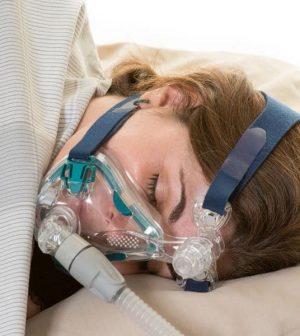- Could Your Grocery Store Meat Be Causing Recurring UTIs?
- Are You Making This Expensive Thermostat Error This Winter?
- Recognizing the Signs of Hypothyroidism
- 10 Strategies to Overcome Insomnia
- Could Artificial Sweeteners Be Aging the Brain Faster?
- Techniques for Soothing Your Nervous System
- Does the Water in Your House Smell Funny? Here’s Why
- Can a Daily Dose of Apple Cider Vinegar Actually Aid Weight Loss?
- 6 Health Beverages That Can Actually Spike Your Blood Sugar
- Treatment Options for Social Anxiety Disorder
Sleep Apnea Might Raise Odds for Painful Gout

People with sleep apnea have higher chances of developing gout, a new study suggests.
Researchers analyzed data on nearly 16,000 people with sleep apnea and more than 63,000 people without apnea who were followed for a median of nearly six years. (Half were followed longer, half for less time.)
Overall, 4.9 percent of sleep apnea patients and 2.6 percent of the others developed gout. People with sleep apnea had a 42 percent higher risk of gout, the study found.
The increased risk was highest one to two years after sleep apnea diagnosis, and was greater for patients with normal body weight than among those who were overweight or obese, the researchers said.
Of course, the study couldn’t prove that apnea causes gout, just that there was an association.
Gout is a painful form of arthritis caused by a buildup of uric acid in the body. It causes swollen, red, hot and stiff joints.
The study was published Aug. 30 in the journal Arthritis & Rheumatology.
“People with sleep apnea are at an increased risk of gout in both the short and long term. Since this risk was highest in people with normal body mass index, doctors and other health professionals should consider the possibility of gout in patients with sleep apnea regardless of body mass index,” study co-leader Edward Roddy said in a journal news release.
Roddy is a clinical lecturer in rheumatology at Keele University in Staffordshire, England.
It’s believed that periodic low levels of oxygen caused by sleep apnea lead to overproduction of uric acid, causing gout, the researchers said.
“Sleep apnea is commonly treated with continuous positive airways pressure — or CPAP — therapy. Since CPAP treatment corrects low oxygen levels it might also be expected to reduce uric acid levels, which could possibly reduce the risk of developing gout or treat existing gout,” said study co-leader Milica Blagojevic-Bucknall.
She said more research is needed to investigate the effect of CPAP treatment in people with gout.
Blagojevic-Bucknall is a lecturer at Keele University.
More information
The U.S. National Institute of Arthritis and Musculoskeletal and Skin Diseases has more on gout.
Source: HealthDay
Copyright © 2026 HealthDay. All rights reserved.










